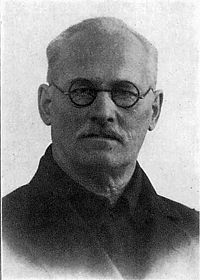Alexey Troitsky

Alexey Alexeyevich Troitsky (Template:Lang-ru; March 14, 1866 – August 1942; also Alexei, Troitzky, Troitzki) was a chess theoretician. He is widely considered to have been one of the greatest composers of chess endgame studies.[1] He is widely regarded as the founder of the modern art of composing chess studies (Seirawan 2003:91). Troitsky died of starvation during World War II at the siege of Leningrad, where his notes were destroyed.
One of his most famous works involves analyzing the endgame with two knights versus a pawn, see Troitsky line. John Nunn analyzed this endgame with an endgame tablebase and stated that "the analysis of Troitsky ... is astonishingly accurate" (Nunn 1995:265).
Compositions
Troitsky was a prolific composer of endgame studies. Irving Chernev included nine of them in his book 200 Brilliant Endgames. The diagram shows one of them.
| a | b | c | d | e | f | g | h | ||
| 8 |  | 8 | |||||||
| 7 | 7 | ||||||||
| 6 | 6 | ||||||||
| 5 | 5 | ||||||||
| 4 | 4 | ||||||||
| 3 | 3 | ||||||||
| 2 | 2 | ||||||||
| 1 | 1 | ||||||||
| a | b | c | d | e | f | g | h | ||
The main line goes:
- 1. Nb6! Qe8
- 2. Nd7! Kc4
- 3. Qxc7+ Kb4
- 4. Qc5+ Kb3
- 5. Qc3+ Ka4
- 6. Qd4+ Ka3
- 7. Nc5 Qb8
- 8. Qa1+ Kb4
- 9. Na6+
and White wins (Chernev 1989:207–8).
Books
- Troitzky, A. (1924), 500 Endspielstudien, Verlag Kagan Berlin
- Troitzky, A. A. (1968), 360 Brilliant and Instructive End Games, Dover Publications (reprint), ISBN 0-486-21959-3
- Troitzky, A. (1992), Collection of Studies, Tschaturanga Ed. Olms, ISBN 3-283-00114-6. Reprinted in 2006 by Ishi Press, ISBN 0-923891-10-2. The 360 studies above plus a supplement on the theory of the endgame of two knights against pawns.
See also
- Two knights endgame (contains Troitsky line)
Notes
References
- Chernev, Irving (1989), 200 Brilliant Endgames, Dover, ISBN 0-486-43211-4
- Nunn, John (1995), Secrets of Minor-Piece Endings, Batsford, ISBN 0-8050-4228-8
- Seirawan, Yasser (2003), Winning Chess Endings, Everyman Chess, ISBN 1-85744-348-9
External links
- Troitzky Chess, invented by Paul Byway, a chess variant where checkmate by two knights can be forced.
